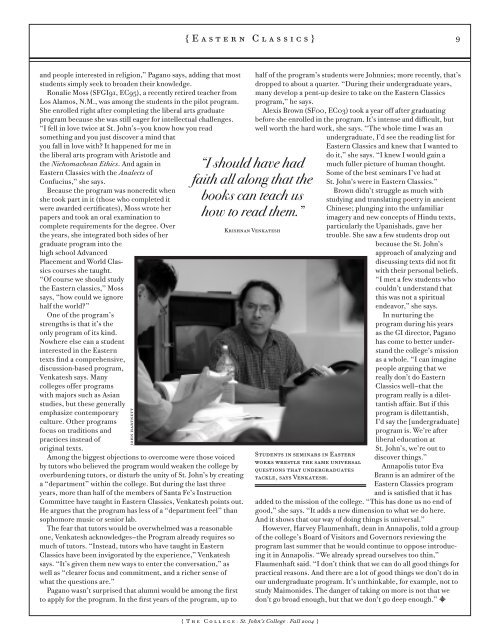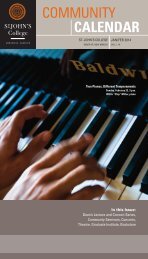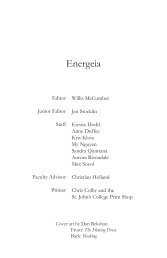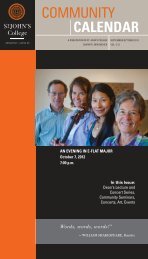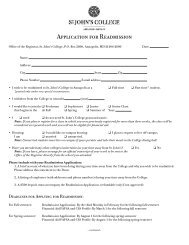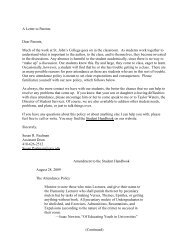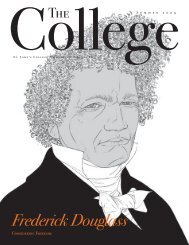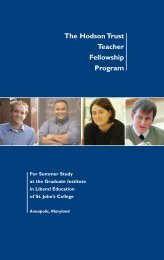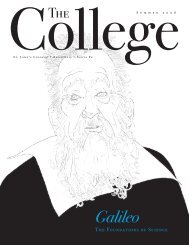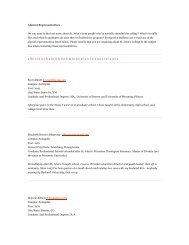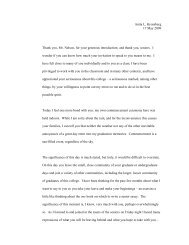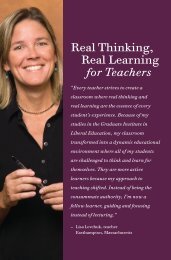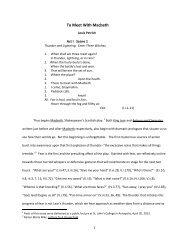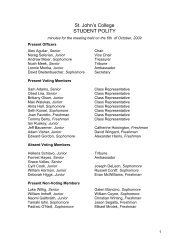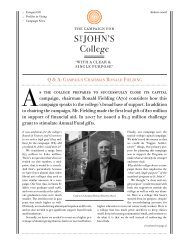Magazine - summer 03 - St. John's College
Magazine - summer 03 - St. John's College
Magazine - summer 03 - St. John's College
Create successful ePaper yourself
Turn your PDF publications into a flip-book with our unique Google optimized e-Paper software.
{Eastern Classics}<br />
9<br />
and people interested in religion,” Pagano says, adding that most<br />
students simply seek to broaden their knowledge.<br />
Ronalie Moss (SFGI91, EC95), a recently retired teacher from<br />
Los Alamos, N.M., was among the students in the pilot program.<br />
She enrolled right after completing the liberal arts graduate<br />
program because she was still eager for intellectual challenges.<br />
“I fell in love twice at <strong>St</strong>. John’s—you know how you read<br />
something and you just discover a mind that<br />
you fall in love with? It happened for me in<br />
the liberal arts program with Aristotle and<br />
the Nichomachean Ethics. And again in<br />
Eastern Classics with the Analects of<br />
Confucius,” she says.<br />
Because the program was noncredit when<br />
she took part in it (those who completed it<br />
were awarded certificates), Moss wrote her<br />
papers and took an oral examination to<br />
complete requirements for the degree. Over<br />
the years, she integrated both sides of her<br />
graduate program into the<br />
high school Advanced<br />
Placement and World Classics<br />
courses she taught.<br />
“Of course we should study<br />
the Eastern classics,” Moss<br />
says, “how could we ignore<br />
half the world?”<br />
One of the program’s<br />
strengths is that it’s the<br />
only program of its kind.<br />
Nowhere else can a student<br />
interested in the Eastern<br />
texts find a comprehensive,<br />
discussion-based program,<br />
Venkatesh says. Many<br />
colleges offer programs<br />
with majors such as Asian<br />
studies, but these generally<br />
emphasize contemporary<br />
culture. Other programs<br />
focus on traditions and<br />
john hartnett<br />
practices instead of<br />
original texts.<br />
Among the biggest objections to overcome were those voiced<br />
by tutors who believed the program would weaken the college by<br />
overburdening tutors, or disturb the unity of <strong>St</strong>. John’s by creating<br />
a “department” within the college. But during the last three<br />
years, more than half of the members of Santa Fe’s Instruction<br />
Committee have taught in Eastern Classics, Venkatesh points out.<br />
He argues that the program has less of a “department feel” than<br />
sophomore music or senior lab.<br />
The fear that tutors would be overwhelmed was a reasonable<br />
one, Venkatesh acknowledges—the Program already requires so<br />
much of tutors. “Instead, tutors who have taught in Eastern<br />
Classics have been invigorated by the experience,” Venkatesh<br />
says. “It’s given them new ways to enter the conversation,” as<br />
well as “clearer focus and commitment, and a richer sense of<br />
what the questions are.”<br />
Pagano wasn’t surprised that alumni would be among the first<br />
to apply for the program. In the first years of the program, up to<br />
“I should have had<br />
faith all along that the<br />
books can teach us<br />
how to read them.”<br />
Krishnan Venkatesh<br />
half of the program’s students were Johnnies; more recently, that’s<br />
dropped to about a quarter. “During their undergraduate years,<br />
many develop a pent-up desire to take on the Eastern Classics<br />
program,” he says.<br />
Alexis Brown (SF00, EC<strong>03</strong>) took a year off after graduating<br />
before she enrolled in the program. It’s intense and difficult, but<br />
well worth the hard work, she says. “The whole time I was an<br />
undergraduate, I’d see the reading list for<br />
Eastern Classics and knew that I wanted to<br />
do it,” she says. “I knew I would gain a<br />
<strong>St</strong>udents in seminars in Eastern<br />
works wrestle the same universal<br />
questions that undergraduates<br />
tackle, says Venkatesh.<br />
much fuller picture of human thought.<br />
Some of the best seminars I’ve had at<br />
<strong>St</strong>. John’s were in Eastern Classics.”<br />
Brown didn’t struggle as much with<br />
studying and translating poetry in ancient<br />
Chinese; plunging into the unfamiliar<br />
imagery and new concepts of Hindu texts,<br />
particularly the Upanishads, gave her<br />
trouble. She saw a few students drop out<br />
because the <strong>St</strong>. John’s<br />
approach of analyzing and<br />
discussing texts did not fit<br />
with their personal beliefs.<br />
“I met a few students who<br />
couldn’t understand that<br />
this was not a spiritual<br />
endeavor,” she says.<br />
In nurturing the<br />
program during his years<br />
as the GI director, Pagano<br />
has come to better understand<br />
the college’s mission<br />
as a whole. “I can imagine<br />
people arguing that we<br />
really don’t do Eastern<br />
Classics well—that the<br />
program really is a dilettantish<br />
affair. But if this<br />
program is dilettantish,<br />
I’d say the [undergraduate]<br />
program is. We’re after<br />
liberal education at<br />
<strong>St</strong>. John’s, we’re out to<br />
discover things.”<br />
Annapolis tutor Eva<br />
Brann is an admirer of the<br />
Eastern Classics program<br />
and is satisfied that it has<br />
added to the mission of the college. “This has done us no end of<br />
good,” she says. “It adds a new dimension to what we do here.<br />
And it shows that our way of doing things is universal.”<br />
However, Harvey Flaumenhaft, dean in Annapolis, told a group<br />
of the college’s Board of Visitors and Governors reviewing the<br />
program last <strong>summer</strong> that he would continue to oppose introducing<br />
it in Annapolis. “We already spread ourselves too thin,”<br />
Flaumenhaft said. “I don’t think that we can do all good things for<br />
practical reasons. And there are a lot of good things we don’t do in<br />
our undergraduate program. It’s unthinkable, for example, not to<br />
study Maimonides. The danger of taking on more is not that we<br />
don’t go broad enough, but that we don’t go deep enough.” x<br />
{ The <strong>College</strong> • <strong>St</strong>. John’s <strong>College</strong> • Fall 2004 }


